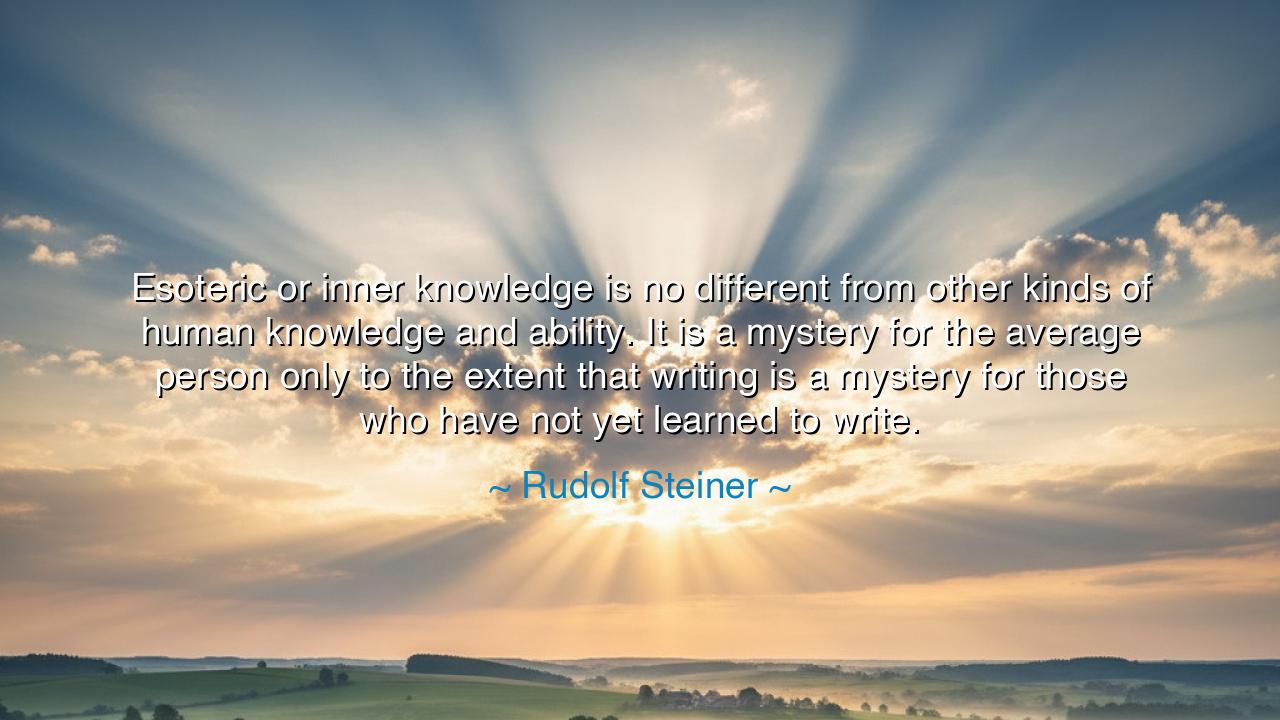
Esoteric or inner knowledge is no different from other kinds of
Esoteric or inner knowledge is no different from other kinds of human knowledge and ability. It is a mystery for the average person only to the extent that writing is a mystery for those who have not yet learned to write.






When Rudolf Steiner, the mystic philosopher and founder of Anthroposophy, declared, “Esoteric or inner knowledge is no different from other kinds of human knowledge and ability. It is a mystery for the average person only to the extent that writing is a mystery for those who have not yet learned to write,” he was unveiling a profound and compassionate truth about the human spirit. His words strike like a chime in the quiet of the soul — reminding us that what seems mystical or unreachable is not divine privilege, but human potential waiting to be awakened. He speaks not as one who guards a secret, but as a teacher who believes that every soul carries the key to its own enlightenment.
To understand his meaning, we must know the origin of these words. Steiner lived in an age of transition — when science claimed dominion over truth, and spirituality was being dismissed as illusion. Yet he stood as a bridge between both worlds, teaching that knowledge of the spirit was not fantasy, but the natural extension of human understanding. Just as the mind once learned to read the symbols of language and transform them into thought, so too, he said, can the inner self learn to perceive the unseen truths of existence. What we call “esoteric” is simply that which has not yet been studied; what we call “mystery” is merely what we have not yet understood.
When Steiner compares inner knowledge to writing, he speaks in the voice of the ancient teachers — those who believed that wisdom is not given, but cultivated. To the illiterate, letters on a page appear as meaningless marks; but once one learns to read, those marks become poetry, history, revelation. So it is with the mysteries of the spirit. To the untrained, the language of intuition, meditation, and insight seems obscure. But to those who discipline the mind and awaken the heart, that same language reveals the hidden order of the cosmos. What was once “supernatural” becomes simply natural, seen through awakened eyes.
History offers a living mirror to Steiner’s wisdom. In the sixteenth century, Galileo Galilei turned his telescope toward the heavens and saw worlds where others saw only darkness. To his peers, his discoveries were heresy — a challenge to all they thought they knew. But Galileo did not touch the divine; he merely learned to look more deeply into what already was. His courage transformed mystery into knowledge, just as the philosopher’s insight transforms wonder into understanding. The same principle guides every seeker of truth: what is hidden is not beyond reach; it awaits only the courage and patience to be seen.
Steiner’s teaching also carries a deeper moral resonance. It tells us that no one is excluded from the pursuit of truth. The initiate and the ordinary person are divided not by fate, but by effort. Spiritual understanding, like writing, demands practice — attention, humility, and perseverance. To say “I cannot know” is to choose blindness; to say “I will learn” is to begin the path of awakening. Thus, the doors of wisdom are not locked — they are simply unopened. And the hand that opens them is not divine intervention, but the discipline of the self.
This idea transforms how we see not only spirituality but education, art, and science. It reminds us that all mastery — whether of music, mathematics, or meditation — begins in ignorance and blossoms through practice. The child who cannot yet read may one day write poetry; the mind that cannot yet meditate may one day touch the infinite. Steiner’s words urge us to respect the gradual unfolding of ability, to see mystery not as exclusion, but as invitation. Every unknown thing whispers: “Come closer, and learn me.”
The lesson of this teaching is eternal: do not fear mystery, but study it. Approach the unknown as the student approaches the alphabet — with humility and wonder. Do not believe that spiritual insight is the privilege of the few; it is the destiny of all who seek sincerely. Every person can cultivate the eyes to see inwardly, the ears to hear truth in silence. Let patience be your teacher, and perseverance your prayer.
And so, let Rudolf Steiner’s words echo across generations: there are no secrets in the universe, only unread pages. The book of life lies open before all — its language written in the patterns of the stars, in the quiet voice of conscience, in the rhythms of nature and thought. Learn to read it, as the child learns to write, and the mysteries will dissolve into understanding. For in the end, the greatest revelation is not that there are hidden truths, but that we were always capable of perceiving them.






AAdministratorAdministrator
Welcome, honored guests. Please leave a comment, we will respond soon